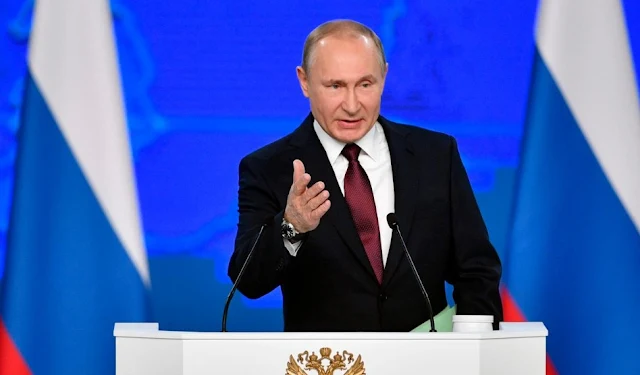 |
| Russian President Vladimir Putin Announces 4 New Security Measures in Russia |
Moscow - Russia has introduced emergency measures due to the ongoing threat posed by Ukraine and the need for a more efficient response to it. Russian President Vladimir Putin announced this on Wednesday (19/10/2022). Speaking at a meeting of the National Security Council, Putin said he had signed several documents detailing the policy changes.
He also repeated the accusations against Kiev, alleging they were using "terrorist methods" against Russia. “Ukrainian forces are sabotaging critical infrastructure and carrying out assassinations of local officials. Just like their ideological ancestor, Hitler's collaborator (Stepan Bandera), they are trying to create a criminal underworld, sending sabotage teams on our land," Putin stressed.
He claimed Russian law enforcement officials had prevented several planned attacks on "mass gathering, transport and energy facilities," including nuclear power plants.
Here are 4 new security measures announced by Russian President Vladimir Putin:
1. Martial Law in 4 Regions
Russian President Vladimir Putin has imposed martial law in Russia's four new federal regions: the Donetsk and Luhansk People's Republics and the Kherson and Zaporozhye Regions. Their citizens voted in last month's referendum to break away from Kiev and join Russia. Ukraine has rejected the validity of the referendum.
"The four provinces already imposed martial law when Russia accepted their offer," Putin said. "The decree, which he hopes parliament will ratify quickly, will provide a legal basis under Russian law for what is de facto happening on the ground," Putin said.
2. Alert Regime
In a separate decree, Putin ordered "medium-level action" in other parts of western Russia. The region includes the Republic of Crimea, the city of Sevastopol, as well as the Krasnodar, Belgorod, Bryansk, Voronezh, Kursk and Rostov Regions. Special regimes give additional authority to local officials to ensure security and react quickly to any emergency.
The rest of Russia is placed at "high" and "basic" levels, depending on its proximity to Ukraine. The administrations of the four regions under martial law will have a "maximum" level of additional authority. "Governors from different parts of Russia face different challenges and need different powers to deal with them," Putin told the security council.
3. Government Coordination
The president instructed the Russian federal government to establish a special coordination center for various aspects of the Ukraine crisis, from repairing weapons systems for the military to providing medical care to the wounded and repairing damage suffered to cities during hostilities. President Vladimir Putin also ordered federal officials responsible for coordinating with regional authorities to provide Moscow with assistance in dealing with their new duties and powers.
4. Support for Mobilized Reserve Forces
Another set of instructions told the Defense Ministry to ensure people enlisted in active military service under partial mobilization are paid according to their rights.
The document stipulates a minimum monthly wage of 195,000 rubles (over USD3,000) for each person and tells the Ministry of Finance to allocate money for compensation. Putin said he was reacting to reports of cases of wages not being paid on time and stressed the importance of giving the military what it needs to do its job properly.
“This includes barracks and shelters, living conditions, uniforms and equipment, food, medical care. We have every opportunity to solve all problems that arise in a way that is worthy of our nation," the president stressed.
